Xining strives to build itself into a city of happiness
Xining, capital city of northwest China's Qinghai province, has witnessed an improving ecological environment and public wellbeing thanks to years of efforts, making it one of the country's top ten happiest cities. Now residents of multiple ethnic groups in the city, also the largest city on the Qinghai-Tibetan Plateau, are living in harmony and with an increasing sense of happiness.
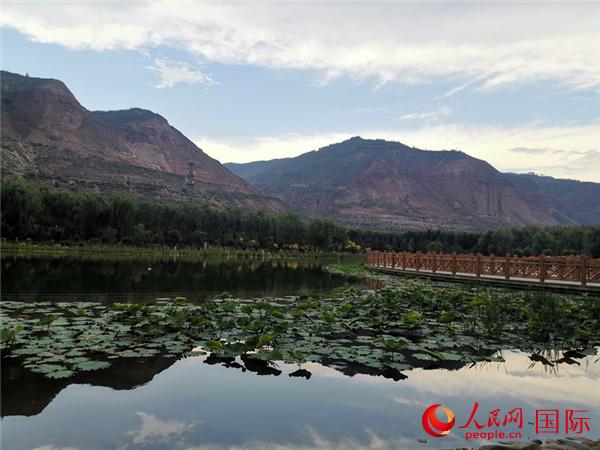
Photo shows a scene of a park in Xining, northwest China's Qinghai province. [People's Daily Online/Yang Qian]
The city has prioritized ecological protection and green development to create a beautiful and livable environment for its residents in recent years. It has raised its forest coverage ratio to 36 percent and has increased the per capita area of its parks and green spaces to 13 square meters from 12 square meters per person. Of particular note, the forest coverage ratio for the city's Nanshan and Beishan mountains has risen from 7.2 percent to 79 percent, which has greatly increased the area's oxygen levels while reducing the odds of geological disasters such as landslides and mudslides.
By taking advantage of its improved ecological environment, Xining has striven to develop its tourism industry, which has brought about huge benefits for residents. In the first half of this year, the city received over 10.3 million tourists, representing a year-on-year increase of 66.81 percent, and generating tourism revenues of 10.8 billion yuan (about $1.67 billion), up 94.31 percent from the same period last year, according to official data.
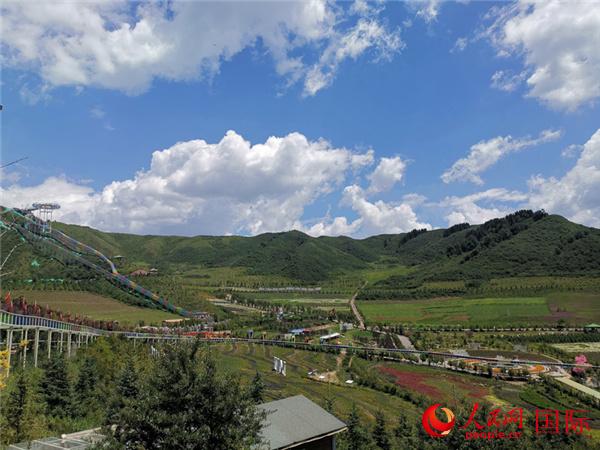
Photo shows the "sea of flowers" scenic area in Bianmagou village in Xining, northwest China's Qinghai province. [People's Daily Online/Yang Qian]
For example, Bianmagou village in the city's Datong Hui and Tu autonomous county has taken advantage of its natural resources and China's poverty alleviation projects to develop rural tourism.
In the past, the crop yield using its limited arable land could hardly support local households due to the barren soil, so younger generations left the locality in search of work elsewhere. In 2016, a "sea of flowers" scenic area in the village opened up to tourists, which has supported residents to enjoy a more prosperous life.
The scenic area attracted 300,000 tourists in its first year of operations, helping lift all of the impoverished villagers in the area out of poverty. Last year, the scenic spot received over 800,000 tourists, with ticket sales reaching 4.5 million yuan and sales from nearby homestay hotels, supermarkets and upstream and downstream supply chains hitting 15 million yuan. The per capita disposable income of villagers rose to 18,450 yuan in 2020, climbing from 1,800 yuan in 2015.
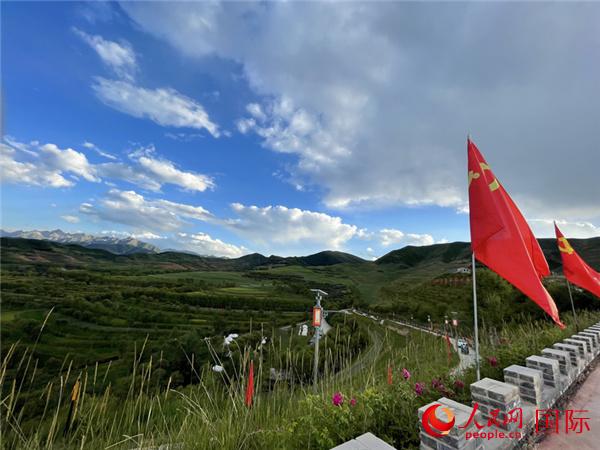
Photo shows a red education base in Xiaogaoling village in Xining, northwest China's Qinghai province. [People's Daily Online/Xie Ying]
Tie Chengyu, 57, is one of the locals who has benefited from the development of rural tourism by running an agritainment restaurant. Last year, Tie made more than 100,000 yuan from his agritainment restaurant, receiving rental fees for his farmland that has since been transferred to the scenic spot, and an annual bonus from tourism profits redistributed by the village. Tie plans to build a two-story house to run a homestay business with his son in the future.
Xining has also developed local specialty industries and advanced industrial upgrading. Tibetan carpets are a traditional handicraft on the Qinghai-Tibetan Plateau. In 2006, the Jiaya Tibetan carpet weaving skills of the city's Jiaya village were inscribed into the first list of China's national intangible cultural heritage items.
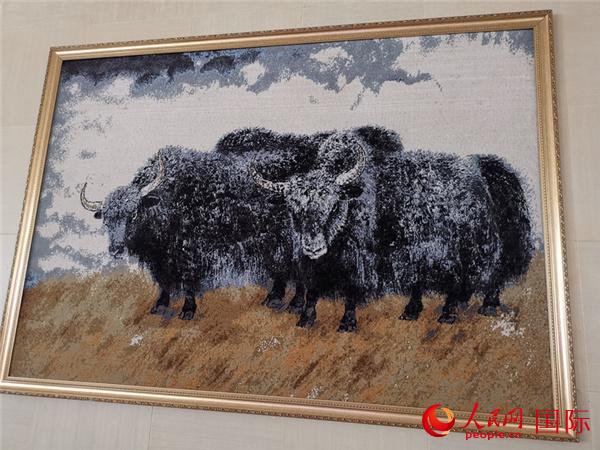
Photo shows a Tibetan carpet produced by Shengyuan Carpet Group Co., Ltd., a Tibetan carpet manufacturing company based in Xining, northwest China's Qinghai province. [People's Daily Online/Yang Qian]
Shengyuan Carpet Group Co., Ltd. is a Tibetan carpet manufacturing company based in Xining. By integrating advanced technology into the traditional craftsmanship of the carpets, the firm has upgraded the traditional carpet industry. It has exported its products to more than 40 countries and regions, with an annual output value of some 80 million yuan.
The Tibetan carpet industry, an industry that suits Qinghai's actual situation, helps people get out of poverty and boost rural vitalization and promotes ethnic unity, Chinese President Xi Jinping said while visiting the firm during an inspection tour of the province in June this year.
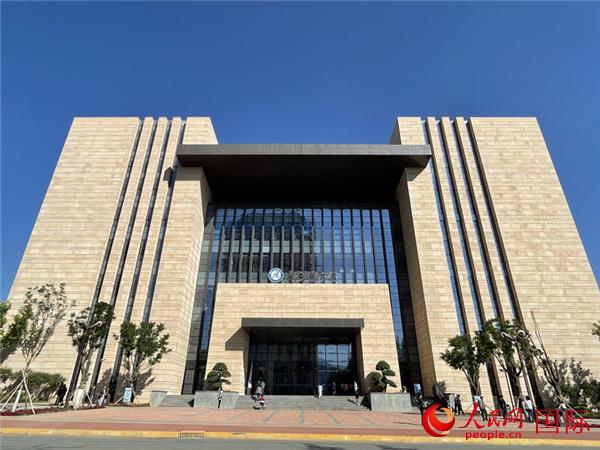
Photo shows the Xining civil center in Xining, northwest China's Qinghai province. [People's Daily Online/Xie Ying]
Furthermore, Xining has given priority to improving public services. The Xining civil center, a key project for ensuring people's wellbeing in the province, allows residents and enterprises to receive one-stop government services and conduct their daily business.
So far, 36 government departments have provided over 500 items of administrative approval and government services at 430 service counters in the center.
The city has also strengthened efforts to improve community services and strengthen ethnic unity. The Wentingxiang community in the city, home to 22,769 residents comprised of different ethnic groups, holds various activities such as cooking together to celebrate traditional festivals and share old photos to enhance citizens' sense of happiness. The community also provides community-based after-school services for children and home-based care for the elderly.
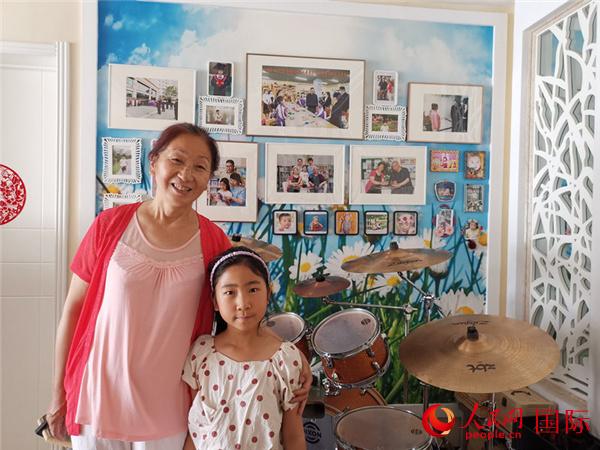
Photo shows Gao Shuzhen and her granddaughter in the Wentingxiang community in Xining, northwest China's Qinghai province. [People's Daily Online/Yang Qian]
Gao Shuzhen, 65, enjoys her life now in the community. "Our community activities often wowed my relatives and friends when I shared them on social media," Gao told People's Daily Online.
"The government has taken care of every aspect of residents' lives, and I feel so happy to live in Xining," Gao said about her life, explaining that her retirement pension increases year by year and she enjoys a high medical insurance reimbursement rate.
























